Mention sauerkraut, pickles, or kimchi and just look at the expression on people’s faces. Many people are turned off by the thought of it. It’s such an unfortunate event since the benefits of fermented foods are so great for our health, which is what I hope to convince you of by the time you’re done reading this.
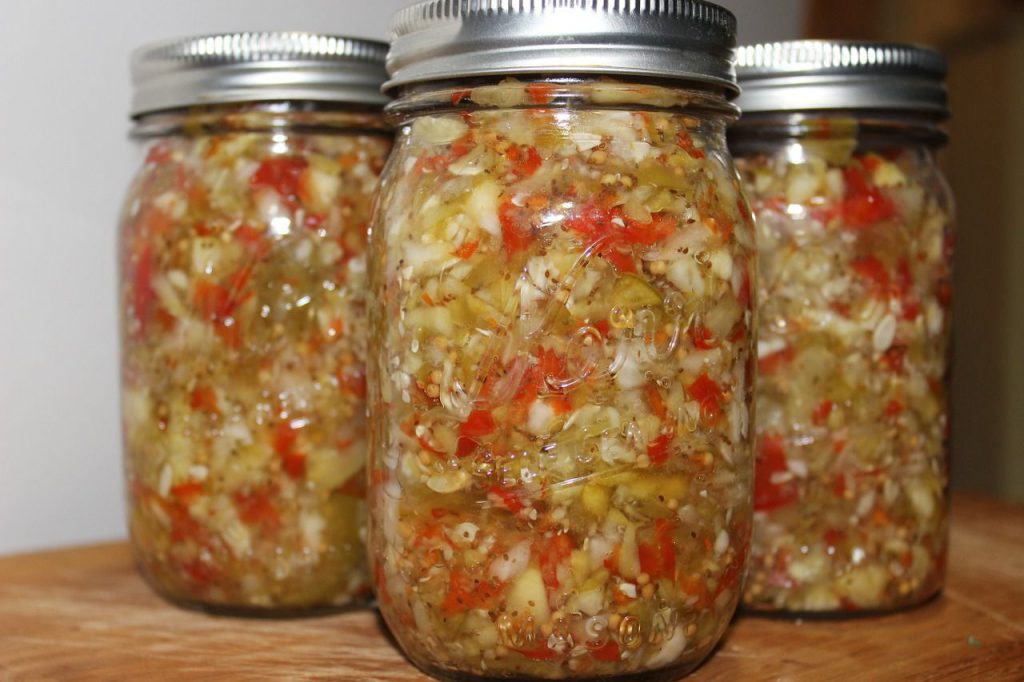
Sadly, fermented foods may not be a high priority in American culture. Since the advent of industrialization, foods fermented the traditional way have lost out to quicker ways of preparation in an advanced society. But in most cultures around the world they are a long standing tradition and staple consumed on a regular basis, if not at each meal.
Chances are, if you’ve had a bad initial experience with these foods, it’s likely it wasn’t a true fermented version. Most jars or cans of sauerkraut and pickles found in grocery stores, or served on a reuben or sausage sandwich are pasteurized versions of cabbage and cucumbers with added sugar, sodium, vinegar, flavorings, and preservatives.
Not only are these lacking in nutrition, they also taste no where near as delicious as the real lacto-fermented versions.
Fortunately in the last several years there has been a revival of fermented foods. Many people, including myself are jumping on the bubbly bandwagon and making regular batches of ferments at home.
What is Lacto-Fermentation?
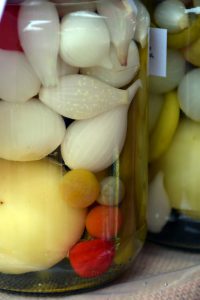 Lacto-fermentation is an ancient form of food preservation dating back thousands of years. The actual process takes place when various strains of friendly bacteria (Lactobacillus) present on the surface of plants including fruits and vegetables (especially those growing close to the ground) convert the natural starches and sugars in them to lactic acid.
Lacto-fermentation is an ancient form of food preservation dating back thousands of years. The actual process takes place when various strains of friendly bacteria (Lactobacillus) present on the surface of plants including fruits and vegetables (especially those growing close to the ground) convert the natural starches and sugars in them to lactic acid.
Lactic acid is a natural preservative that inhibits the growth of harmful bacteria and increases the vitamin and enzyme levels of fermented foods and makes them highly easy to digest. Out of all the natural preservatives, lactic acid is most easily used by the body without causing over-acidifying effects.
Why is Lacto-Fermentation Beneficial?
Lacto-fermentation results in a nutrient-dense, enzyme rich food teeming with live probiotics. In short, fermented foods provide the gut with healthy bacteria to strengthen the immune system and create an anti-inflammatory environment.
In the book Nourishing Traditions, Sally Fallon describes the benefits: “The proliferation of lactobacilli in fermented vegetables enhances their digestibility and increases vitamin levels. These beneficial organisms produce numerous helpful enzymes as well as antibiotic and anti carcinogenic substances. Their main by-product, lactic acid, not only keeps vegetables and fruits in a state of perfect preservation but also promotes the growth of healthy flora throughout the intestine.”
What Does This Mean for Your Health?
Fermented foods are some of the most enzyme and probiotic rich foods. By populating the digestive tract with healthy bacteria, probiotics promote the growth of healthy micro-flora which help to create and maintain a balanced environment within the gut which is now known to be the basis of strong immune health. A healthy immune system decreases allergic reactions and contributes to healthier aging. Research has also shown probiotics to decrease risk of infections and some diseases.
In the 1700’s fermented foods like sauerkraut and pickles were staples on ships at sea for long periods of time since they kept well requiring no refrigeration and the vitamin content helped keep the crew free from scurvy. Sauerkraut was also part of daily food rations on German ships in World War I and II to prevent scurvy.
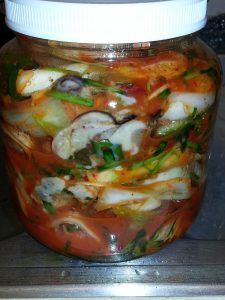 The decline of probiotics and enzymes in the Standard American Diet has contributed to imbalances in the gut leading to inflammatory conditions such as digestive problems, absorption issues, and immune deficiency. Adding more probiotic rich foods can help improve digestion and regularity along with helping you to absorb more nutrients from foods.
The decline of probiotics and enzymes in the Standard American Diet has contributed to imbalances in the gut leading to inflammatory conditions such as digestive problems, absorption issues, and immune deficiency. Adding more probiotic rich foods can help improve digestion and regularity along with helping you to absorb more nutrients from foods.
Some examples of this are in German culture where sauerkraut has been eaten with sausages and other meats for centuries, which aids in the digestion and absorption of nutrients in the meat, and kimchi eaten with meals in Korean culture for the same purpose.
Why Ferment at Home?
With the right instructions, a little patience, and very few supplies, you can learn how to ferment your own foods at home. Here are a few benefits of fermenting your own foods at home:
Simplicity. Once you have your vessels to ferment and store your ferments in, and your airlock lids which are optional, but I’ve found them to make the process much easier while consistently producing successful ferments, it’s really a matter of only a few ingredients.
For example, sauerkraut and pickles are some of the easiest things to make – sauerkraut requiring only cabbage, sea salt and water. Kefir water simply uses kefir grains, sugar and water – it’s how I started on this bubbly path. These are delicious as is, and you can make fancier ferments with the addition of a few more fresh herbs and spices.
Longer Storage: Fermenting foods allows you to extend their nutritional benefits for long periods of time. For example, a jar of regular salsa last a few days to a few weeks in the refrigerator, while the same salsa fermented will last several months.
Live Probiotics: Fermented foods are teeming with probiotics and enzymes in a live food which means that if you consume them daily you most likely won’t have a need for probiotic or enzyme supplements.
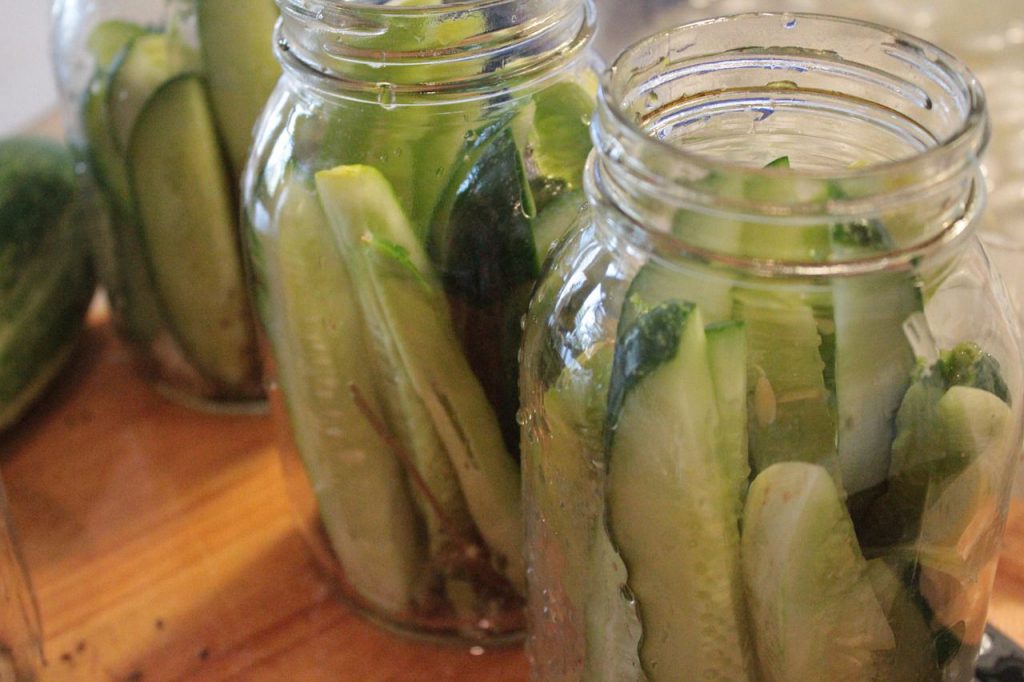
Save Money: While store bought fermented foods are fantastic they can be quite spendy. For example, I used to buy Bubbies sauerkraut which costs upwards of $6 plus, depending on where you get it, and now I make that same kraut for around $2 for a bigger batch, which is a tremendous savings. Things like kombucha and kefir water can be made for pennies on the dollar.
Fun and Rewarding: Fermenting foods at home is a fun process you can get the whole family involved with. Kids love to get their hands in the jars and pound things down. And the rewards of the minimal amount of labor that goes into making your own ferments makes it totally worth it!
Are Fermented Foods Safe to Eat, Especially When Made at Home?
At first, the thought of fermented foods can be intimidating, and you may question the safety of making your own fermented foods at home. But really, when properly made, these foods are very safe to eat. Don’t let this intimidate you, these are some of the easiest foods for even a beginner to prepare and remember, the lactic acid bacteria in the fermentation process are one of the best killer’s of bad bacteria.
Very occasionally a batch may go bad, meaning it grows a mold on it (different from non-harmful kahm yeast) or may have a horrible smell you can’t get near after fermentation, in which case if the signs are there it’s really hard to consume a bad batch – you will want to – and should toss it out right away.
Do You Need Special Equipment to Ferment at Home?
Not at all. I kind of touched on this under the benefits of fermenting at home. In fact it’s likely you already have most of what you need at home like a mason jar or a crock of sorts with a lid. That’s really all the equipment you need, but I do strongly suggest you grab some fermenting starter lid kits which I will be adding a full review on shortly.
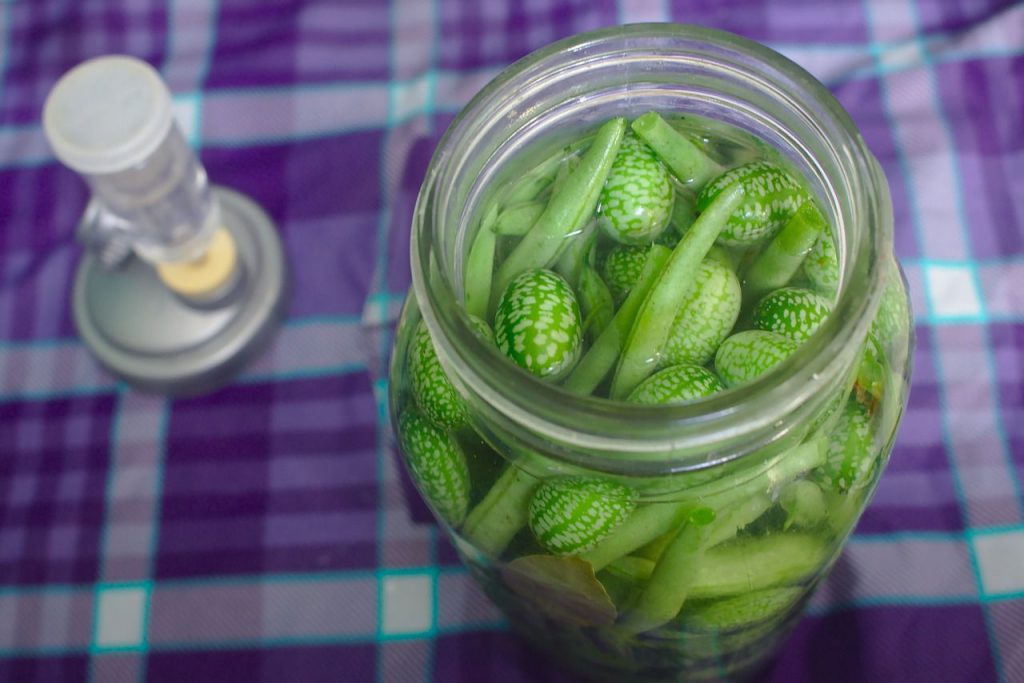
When I first started fermenting I was a little nervous but these airlock lids have made all the difference for me when it comes to successful fermenting. Exposure to oxygen can ruin a good ferment, and airlock lids greatly lessen the chances of this. I really can’t stress enough to invest in some quality airlock lids like the ones in my review.
Some people suggest using a starter culture for veggies but I have great success using simple sea salt or a sea salt and water brine, sometimes with additional herbs and seasonings. Starter cultures can be costly and my veggie ferments come out great without them. If you want a starter culture, this is great one.
How Much Fermented Foods Should I Consume?
When introducing fermented foods in to your diet for the first time it’s a good idea to start off slowly since they are very efficient detoxifiers which can have a cleansing effect. Give your intestinal flora a chance to adjust by starting with two tablespoons before breakfast, lunch, and dinner or a quarter cup once a day and gradually increase.
It’s also good to include a variety of different types of fermented foods and beverages so that your gut gets a mix of different microorganisms.
Where Can I Get Ready Made Fermented Foods?
If you want to enjoy the benefits of fermented foods but don’t have the time or want to make your own, Bubbies is my absolute favorite for store bought sauerkraut made with just cabbage, artesian well water, and salt that is fermented for several weeks. They offer a smaller variety of other fermented foods as well. It’s the closest you can get to homemade. It can be found in most natural foods stores and major grocery store chains.
Farmhouse Culture is another great option, using only cabbage, caraway seeds, and sea salt, and offers a few different types of krauts and “gut shots” as well. Wild Brine does traditional ferments but also spices things up with a variety of fun flavors too. Either can be found in most natural foods stores, but can be harder to find in major grocery store chains.
If you weren’t already convinced of the benefits of fermented foods, I hope that after reading this you are. Like I said, a bubbly journey is a fun and rewarding one and hopefully you are inspired to start adding some fermented foods in to your life and possibly even experiment with making your own.
Questions about fermented foods? Any favorite ferments of your own? Leave a comment in the section below!

My child can’t eat conserved food, but I love it. Thanks author great article
You’re very welcome! Glad you enjoyed the read and also enjoy the benefits of fermented foods :)
It’s great that you talked about the benefits of fermented foods because they provide the gut with healthy bacteria to strengthen the immune system and create an anti-inflammatory environment. I’m prone to allergies, and I’m looking for natural ways to manage it. It’s good to know that fermented foods decreases allergic reactions and contributes to healthier aging because they contain probiotics. I think that I’ll look for available fermented enzyme supplements as well to help me manage my allergies. Thanks for the advice!
Happy you enjoyed the info Margaux and thanks for reading!